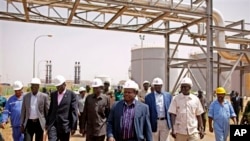JUBA —
South Sudan will start marketing crude from the end of May after resuming oil production on Saturday, its oil minister said on Monday.
Landlocked South Sudan shut down its entire production in January 2012 after failing to agree with Khartoum over oil fees, throwing both nations into turmoil. The new nation, which seceded from Sudan in 2011, needs to export its oil through Sudan.
After months of negotiations, the African neighbors agreed last month to resume cross-border oil flows. The South used to pump around 350,000 barrels per day (bpd) until the shutdown.
The first crude would be marketed at the end of May after arriving at the Sudanese port of Port Sudan by then, Oil Minister Stephen Dhieu Dau said.
He said so far only the small Thar Jath field in Unity State was pumping. Half of the other fields in the state, which borders Sudan, would go online in the next few days.
Oilfields in the Upper Nile state, the country's biggest, are not yet pumping again and would need up to two months to reach their previous output.
"Upper Nile used to produce 250,000 [barrels] a day. In the beginning we will start gradually, maybe 180,000. Within one month or two we will be at the normal production,'' Dau told reporters in Juba after inspecting fields in Unity and Upper Nile state.
Some pipelines had been damaged during fighting with Sudan last year. We ``need time again to install the new equipment, to procure and then to build,'' he said, without elaborating.
On Sunday, another oil official said South Sudan expects an initial oil output of between 150,000 and 200,000 bpd by April 15.
The government expects to book the first oil revenues in July, Dau said.
Both countries, which came close to returning to war a year ago, depend heavily on crude exports for state revenues and use the foreign currency to import food and fuel.
South Sudan seceded from Sudan in 2011 under a 2005 peace deal which ended one of Africa's longest civil wars. However, the two remain at loggerheads over control of disputed territories and other issues.
Landlocked South Sudan shut down its entire production in January 2012 after failing to agree with Khartoum over oil fees, throwing both nations into turmoil. The new nation, which seceded from Sudan in 2011, needs to export its oil through Sudan.
After months of negotiations, the African neighbors agreed last month to resume cross-border oil flows. The South used to pump around 350,000 barrels per day (bpd) until the shutdown.
The first crude would be marketed at the end of May after arriving at the Sudanese port of Port Sudan by then, Oil Minister Stephen Dhieu Dau said.
He said so far only the small Thar Jath field in Unity State was pumping. Half of the other fields in the state, which borders Sudan, would go online in the next few days.
Oilfields in the Upper Nile state, the country's biggest, are not yet pumping again and would need up to two months to reach their previous output.
"Upper Nile used to produce 250,000 [barrels] a day. In the beginning we will start gradually, maybe 180,000. Within one month or two we will be at the normal production,'' Dau told reporters in Juba after inspecting fields in Unity and Upper Nile state.
Some pipelines had been damaged during fighting with Sudan last year. We ``need time again to install the new equipment, to procure and then to build,'' he said, without elaborating.
On Sunday, another oil official said South Sudan expects an initial oil output of between 150,000 and 200,000 bpd by April 15.
The government expects to book the first oil revenues in July, Dau said.
Both countries, which came close to returning to war a year ago, depend heavily on crude exports for state revenues and use the foreign currency to import food and fuel.
South Sudan seceded from Sudan in 2011 under a 2005 peace deal which ended one of Africa's longest civil wars. However, the two remain at loggerheads over control of disputed territories and other issues.





